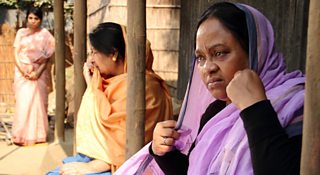Pushing boundaries: a TV birth in Bangladesh
Georgis Bashar
Director, Βι¶ΉΤΌΕΔ Media Action, Bangladesh
Tagged with:

Ujan Ganger Naiya (Sailing Against the Tide) is a TV drama about teenage sisters in a rural village in Bangladesh. They each marry despite the youngest sister Anika being only 16 and desperate to complete her education. As the drama unfolds, we learn more about the dangers of early pregnancy and issues that arise as a result of it.
I have worked on other TV productions about health. But there were a few significant 'firsts' for me in directing in Ujan Ganger Naiya.
For the first time, the storylines and characters were completely grounded in research. We drew on field research and an audience survey and we also collected case studies to find out what was going on in our health context and develop the storylines.
Conservative country
We realised it was important to show birth as it really is so we could inform people about the danger signs and how to respond to them and ensure mothers have the safest possible deliveries. But this had never been done on television before. Even though some of the women in the cast had children, when we asked them what they had experienced during labour, they said "nothing!" because they all had Caesarean sections.
Bangladesh is a very conservative country - men still aren't allowed to into the delivery room. And women are really shy when they're pregnant and often quite poorly informed. Indeed many still believe myths surrounding pregnancy and childbirth - including, for example, that if they tell someone that they are pregnant, a spirit will curse them and the baby would be at risk.
When my colleague showed me birth scenes from TV in the UK, I just didn’t know how we could do this in a way that would feel right for the Bangladeshi audience.Β
Call the Midwife
Help came in the form of Teri Coates, a professional midwife who advises Call the Midwife on Βι¶ΉΤΌΕΔ One. She came to help us direct the birth scenes and showed the actresses how to portray giving birth convincingly. Some members of the crew thought the government wouldn't allow us to show this and we wondered whether there was any point in filming at all. But in the end we decided to trust Teri and go ahead!Β
For over three months we filmed in two villages close to Dhaka- one day when we were packing up, the villagers asked "where are the sweets" – because in Bangladesh when a baby is born you provide sweets! A family in the village even named their new born Ujan, which means tide or river in Bangla, after the drama.

Family viewing
So what did our viewers think?
In rural Bangladesh if a family owns a television, they watch programmes together. In such circumstances, seeing a pregnant woman on TV pant during labour could be uncomfortable viewing for some young women, especially in front of older male relatives.
So prior to airing the birth scenes, we wanted to find out how our target audience might react. We were surprised!
Both men and women of different age groups said they wanted to watch the birth scenes in full. Some of the fathers felt it would be good for their daughters to learn what happens in the delivery room. That it would help them decide when they need to be taken to the hospital and under what circumstances they can have safe home births. Women felt their husbands needed to watch it so that they could empathise with them when they give birth.
And recently I went to a village to film a health public service announcement (PSA). There is only one TV in this village, in the marketplace. I went there and found all the villagers watching Ujan Ganger Naiya. They were discussing what will happen next, who will do what – just as I hoped!
Now that we're preparing to film the second series, we will be introducing other 'firsts' to Bangladeshi TV. And we are even more confident now that the audience is ready for TV that explores issues previously seen as too sensitive to discuss.
Related links
Follow Βι¶ΉΤΌΕΔ Media Action on and
